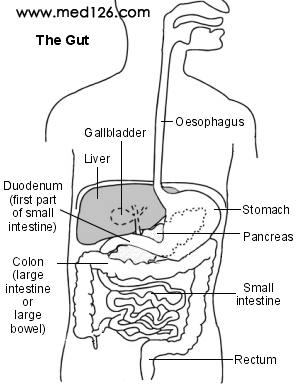
Irritable bowel syndrome (IBS) is a common 'functional' disorder of the gut. (The gut includes the bowels.) A functional disorder is one where there is a problem with the function of a part of the body, but were there is no abnormality in the structure. So, in IBS, the function of the gut is upset, but all parts of the gut look normal, even when looked at under a microscope.
IBS causes abdominal pain and other symptoms (listed below). Up to 1 in 5 people in the UK develop IBS at some stage in their life. IBS can affect anyone at any age, but it commonly first develops in young adults and teenagers. Women are affected more often than men.
What are the symptoms of irritable bowel syndrome?
Some people have occasional mild symptoms. Others have unpleasant symptoms for long periods. Many people fall somewhere in between, with flare-ups of symptoms from time to time. Some doctors group people with IBS into one of three categories:
However, in practice, many people will not fall neatly into any one category, and considerable over-lap occurs.
Note: passing blood is not a symptom of IBS. You should tell a doctor if you pass blood.
Do I need any tests?
There is no test that confirms the diagnosis of IBS. A doctor will diagnose IBS from the typical symptoms. However, some tests are done in some cases to rule out other conditions such as ulcers, colitis, gut infections, etc. For example, tests may be done if symptoms are not typical, or if you develop symptoms of IBS in later life (over the age of about 45) when other conditions need to be ruled out.
What causes irritable bowel syndrome?
The cause is not clear. It may have something to do with overactivity of parts of the gut. The gut is a long muscular tube that goes from the mouth to the anus. The small and large bowel (also called the small and large intestine) are parts of the gut inside the abdomen. Food is passed along by regular contractions (squeezes) of the muscles in the wall of the gut. Pain and other symptoms may develop if the contractions become abnormal or overactive. The area of overactivity in the gut may determine whether constipation or diarrhoea develops. The cause of overactivity in parts of the gut is not clear. One or more of the following may play a part:

Overactivity of the nerves or muscles of the gut. It is not known why this may occur. It may have something to do with overactivity of messages sent from the brain to the gut. Stress or emotional upset may play a role. About half of people with IBS can relate the start of symptoms to a stressful event in their life. Symptoms tend to become worse during times of stress or anxiety.
Intolerance to certain foods may play a part in some cases. However, this is thought to be only in a small number of cases.
Infection and bacteria in the gut. IBS is not caused by an ongoing gut infection. However, in about 1 in 6 cases, the onset of symptoms seems to follow a bout of gastroenteritis (a gut infection which can cause diarrhoea and vomiting). So, perhaps a virus or other germ may 'sensitise' or 'trigger' the gut in some way to cause persisting symptoms of IBS. Also, in some cases, symptoms get worse after taking a course of antibiotics. Antibiotics kill certain harmless bacteria in the gut which changes the balance of bacteria types in the gut.
What are the treatments for irritable bowel syndrome?
Many people are reassured that their condition is IBS, and not something more serious such as colitis. Simply understanding about IBS may help you to be less anxious about the condition, which may ease the severity of symptoms. Symptoms often settle for long periods without any treatment. In some cases, symptoms are mild and do not require treatment. If symptoms are more troublesome or frequent, one or more of the following may help.
Foods, drinks and lifestyle
Some people with IBS find that one or more foods can trigger symptoms, or make symptoms worse ('food intolerance or sensitivity'). A food intolerance is more common in people with IBS who have diarrhoea as a main symptom. If you are not sure if a food is causing symptoms, it may be worth trying a bland diet if symptoms are difficult to control. For example, one meat, one fruit, and one vegetable. (Ideally, this is best done under the supervision of a dietician.) Then, add in different foods gradually to your diet to see if any cause the symptoms. It may be possible to identify one or more foods that cause symptoms. This can be a tedious process, and often no problem food is found. However, some people say that they can control their symptoms by identifying one or more foods that cause symptoms, and then not eating them.医学 全在.线提供www.med126.com
The foods that are most commonly reported to cause IBS symptoms in the UK are: wheat (in bread and cereals), rye, barley, dairy products, coffee (and other caffeine-rich drinks such as tea and cola), and onions.
Some people report an improvement in symptoms when they cut down from drinking a lot of alcohol, or stop smoking if they smoke. Regular exercise may also help to ease symptoms. Stress and other emotional factors may trigger symptoms in some people.
It may help to keep a food and lifestyle diary for 2-4 weeks to monitor symptoms and activities. Note everything that you eat and drink, times that you were stressed, and when you took any formal exercise. This may identify triggers, such as a food, alcohol, or emotional stresses, and may show if exercise helps to ease or prevent symptoms.